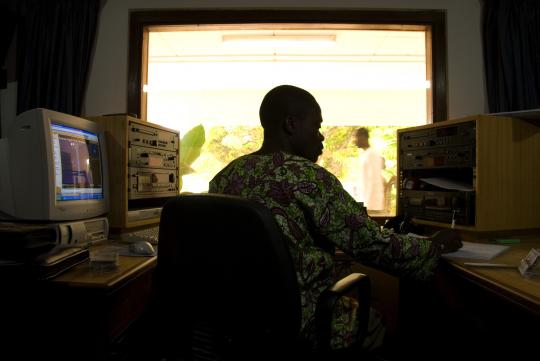 Information and communication technology (ICT) has become an engine of growth and is opening up major opportunities for transformational change. This technological revolution is driven by a continuing exponential decline in the cost of communication and information, and it is likely to continue to drive innovation and wealth creation. As the World Bank Group seeks to end extreme poverty by 2030 and boost shared prosperity, the key questions are: Can ICT contribute substantially to achieving these goals? Where is the evidence? Can we systematically think about the challenges and opportunities? What is needed to realize ICT’s potential?
Information and communication technology (ICT) has become an engine of growth and is opening up major opportunities for transformational change. This technological revolution is driven by a continuing exponential decline in the cost of communication and information, and it is likely to continue to drive innovation and wealth creation. As the World Bank Group seeks to end extreme poverty by 2030 and boost shared prosperity, the key questions are: Can ICT contribute substantially to achieving these goals? Where is the evidence? Can we systematically think about the challenges and opportunities? What is needed to realize ICT’s potential?
We must first appreciate the magnitude of the challenge, and its urgency. The poor lack affordable and reliable access to food, health, education, and other basic services. They lack access to financial services. They are deprived of the key ingredients for productivity and income generation: information and knowledge to improve agricultural practices and small businesses and services. They face extreme vulnerability to economic shocks, natural disasters, ill health, and violence. And they are powerless to influence decisions affecting their lives.
We know that ICT can have a transformative impact on the lives of the poor, but to prove this we need a solid evidence base. I suggest the following framework, and hope we can generate examples of ICT applications and country cases that show how ICT has been critical in supporting five paths out of poverty: access, opportunity, empowerment, security, and sustainability.
Access
- Accelerating the development of human capital and securing the wellbeing of the poor by transforming education and health services, for instance, via e-learning and mobile health.
- Transforming public services and making them accessible and responsive to the poor, via basic e-services and shared Internet access.
Opportunity
- Making finance inclusive, via mobile money and low-cost delivery of microloans.
- Transforming agricultural extension and business development services, for example, by using mobile to provide timely information to farmers and entrepreneurs.
- Improving the investment climate, by using ICT to simplify government transactions with SMEs and reduce corruption and entry barriers.
- Promoting inclusive innovation and better jobs for the poor, for instance, via online work opportunities.
- Improving opportunities and facilities for poor urban communities, by using ICT to map and monitor their needs and support their community development initiatives..
Empowerment
- Opening government and strengthening transparency, accountability, and performance management, for instance, via open government data and local budget tracking.
- Strengthening demand for good governance, for example, via mobile apps to monitor elections and human rights abuses.
Security and Sustainability
- Securing cost-effective cash transfer and corruption-proof social protection programs, by providing unique digital identities for the poor.
- Securing last-mile delivery of food, medicine, and disaster relief, via mobile, sensors, and early warning systems.
- Promoting sustainable resource management systems, via smart grids and flood control systems that use real-time data.
As we gather evidence of the transformative power of ICT, we need to recognize that the challenge is not only technological. It demands better understanding of the poor, their resources, the difficulties they face, and the information they lack. It requires building the capacity of local information intermediaries and grassroots innovators. It requires piloting, experimenting, and taking smart risks. And it demands that governments create the enabling environment to bridge the digital divide.
ICT use can become a powerful force in attacking poverty and helping societies shift to sustainable production and consumption patterns. To realize this potential, governments and their development partners, including business and civil society, must make ICT a key part of broader and smarter strategies to eradicate poverty and promote equitable and sustainable development.
Join the discussion: On Oct. 9, 2013, the World Bank will host a live streamed event on the use of information and communication technologies to end extreme poverty, “ Development in a Digital Age: Technology and Innovation in the Fight Against Extreme Poverty”. The conversation continues with an online chat Oct. 7-23 at Striking Poverty, and in a crowdsourcing campaign using #thinktech4dev to draw in your ideas for the uses of ICTs for poverty alleviation.


Join the Conversation